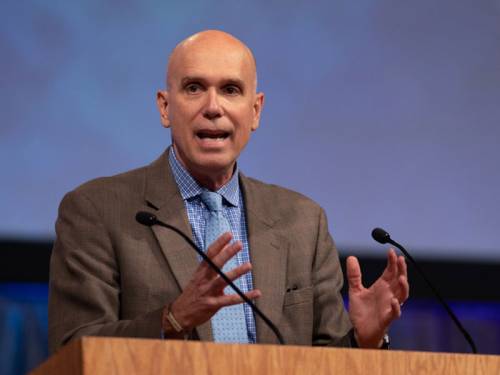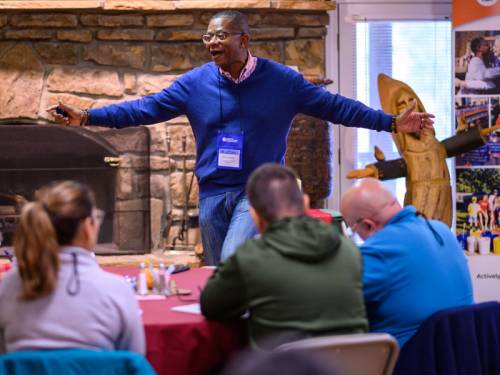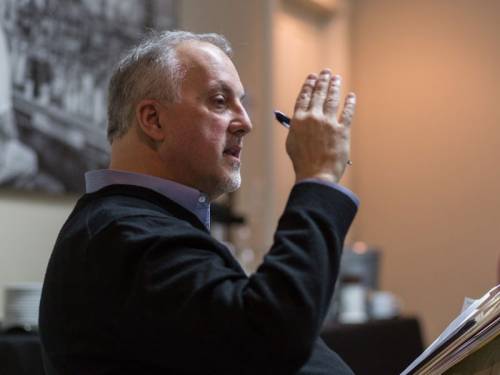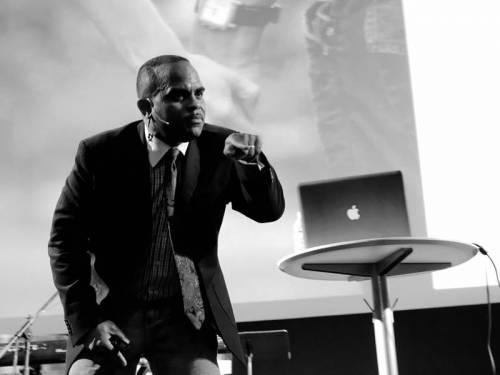Diverse leaders, panelists to help PC(USA) rethink evangelism at upcoming digital conference
By Paul Seebeck | Presbyterian News Service

The Rev. Dr. Ray Jones believes it is necessary for Jesus followers to be ready with words to describe why they are engaged in God’s mission of justice in the world — and how Christ has changed their lives as a result. Michael Whitman
LOUISVILLE — One thing the Rev. Dr. Ray Jones often hears Presbyterians say about evangelism are words attributed to St. Francis of Assisi: “Preach the gospel at all times and if necessary, use words.” But Jones says, “there’s no evidence St. Francis ever said that.”
As one of the key leaders for the Oct. 12–14 Rethinking Evangelism digital conference in partnership with Montreat Conference Center, Jones has been thinking about that popular saying — and how it reflects what Presbyterians think about evangelism.
The Presbyterian Mission Agency director of Theology, Formation & Evangelism ministries said St. Francis was always preaching, using words.
“He even preached to animals,” Jones said.
While it’s clear to Jones that St. Francis’ life and actions were evangelistic — his vow to poverty in a society where clergy lived extravagant lifestyles left people dumbfounded — Jones believes it necessary for us, as Jesus followers, to be about the mission God has given us. And to have the words to tell people how our lives have changed because of Christ.
“But we can’t be talking about the love of God, while working to make sure certain people don’t have access to it,” Jones said. “Our words and actions have to match.”
Presbyterian News Service recently talked with Jones about his understanding of evangelism — and how that will shape what those attending the conference will learn and experience.
Ray, what is Rethinking Evangelism?
Rethinking Evangelism comes out of the context of negativity. For so many people, evangelism has been about two things: getting more church members or getting people into heaven. Of course, we all want this — for people to experience the fullness of life in Christ. But we have to start theologically, with what that means.
So, what does it look like to rethink evangelism theologically?
We’re starting with the whole notion of the body of Christ as a peculiar community — meaning we belong to God. Living as God’s treasured possessions, we are justice people. In our neighborhoods, we want life to be better for all. Justice as a part of evangelism is connected to lifelong discipleship — to what it means to be growing as a follower of Jesus, and to be part of God’s mission of restoring life. Evangelism is a lifestyle that we share in words and actions.
How has the pandemic impacted the church rethinking evangelism?
A significant piece of what’s going on is that increasingly all of us want to make a difference in creating a better world. We are aware that it’s time for the church to get back to our mission, to what we’re supposed to be about — to function as the body of Christ. The pandemic has stripped away everything. More than ever we have the opportunity to ask, “What does it look like to be church?” and to engage the gospel in ways maybe we didn’t have to before the pandemic. Racism was barely under the surface, but its ugly head has been raised. We’ve got to deal with it by going deeper into the body of Christ practices. Not only to do justice, but to also have words that describe our experience of the meaning of life in how we live together.

As one of the key leaders for Rethinking Evangelism, the Rev. Dr. Jerry Cannon will lead worship services of lament and hope with the Rev. Dr. Ray Jones and preach during closing worship. Gregg Brekke/Six View Studios
As one of the key leaders — along with the Rev. Dr. Jerry Cannon of C.N. Jenkins Presbyterian Church — what do you plan to talk about during the conference?
That while evangelism is complicated, it’s always about all the diverse gifts the Holy Spirit brings into our midst. Evangelism is connected to this rich diversity present in God’s Creation — and present through all people living in our churches and neighborhoods. Our focus is on what it means to be the church in Jesus Christ versus being a part of civil religion — which primarily is about getting more of the right people to become part of our churches.
We’re going to look more closely at the story of Jesus talking with a Samaritan woman. The first thing to notice is that Jesus went through Samaria; he didn’t avoid it like the good religious people of his day did. He did so because he knew it was a necessity to be with people on the margins of society. Hospitality also comes into play here. She offers Jesus a drink, which leads to a conversation where the woman finds the meaning of life — her purpose in God. She goes back and tells the whole village, “Here is someone who knows everything about me.” Jesus was concerned about her whole being.

PC(USA) minister the Rev. Mark Ramsey of Macedonian Ministry will facilitate three panel discussions on rethinking evangelism during the digital conference. Courtesy of Macedonian Ministry
The digital conference also features three panel discussions. Below is a brief description of each, followed by those participating in each discussion:
Panel 1: “The antidote to exhaustion is not rest; the antidote to exhaustion is whole-heartedness”
- Ben Johnston-Krase, pastor and co-founder of PC(USA) Farm Church in Durham, North Carolina
- Jennifer Maxell, co-pastor of Breakthrough Fellowship, an African Methodist Episcopal Church in Atlanta
- Amina McIntyre, writer, playwright and preacher currently teaching in the Department of Religion at Vanderbilt Graduate School
- Amy Starr Redwine, senior pastor of First Presbyterian Church of Richmond, Virginia
Panel 2: Competing narratives between the empire and the gospel. Knowing the narrative story of the gospel
- Kevin Haah, lead pastor of New City Church in Los Angeles and a coach of church planters and an adjunct professor at Fuller Seminary
- Adam Mixon, bi-vocational in the tech industry and pastor of Zion Spring Baptist Church in Birmingham, Alabama
- Katie Nakamura Rengers, staff officer for church planting and member of presiding bishop’s staff in the Episcopal Diocese of Alabama
- Denise Thorpe, interim director of the Doctor of Ministry program at Pittsburgh Theological Seminary
Panel 3: Re-conviction – reintroducing church to culture today
- Adam Borneman, a PC(USA) pastor and program director for the Macedonian Ministry Collaborative
- Kristy Farber, senior pastor of Mercer Island Presbyterian Church in Mercer Island, Washington
- Wil McCall, president and CEO of Dallas Leadership Foundation
- Jessica Patchett, senior pastor of Central Presbyterian Church in Atlanta

Columbia Theological Seminary professor Dr. Ralph Watkins will provide biblical and theological grounding for rethinking evangelism during the digital conference. Courtesy of Dr. Ralph Watkins
A limited number of subsidized registrations — $70 for individuals, $60 for group registrations of two or more) — are available for the conference. Registration after the subsidized threshold is $100 per person.
The resource portal for Rethinking Evangelism — which includes “New Way” podcasts hosted by the Rev. Sara Hayden of the PC(USA)’s 1001 New Worshiping Communities movement — will be emailed to all registered participants approximately one week before the conference begins.
So register here now, to beat the Oct. 5 registration deadline.
![]() You may freely reuse and distribute this article in its entirety for non-commercial purposes in any medium. Please include author attribution, photography credits, and a link to the original article. This work is licensed under a Creative Commons Attribution-NonCommercial-NoDeratives 4.0 International License.
You may freely reuse and distribute this article in its entirety for non-commercial purposes in any medium. Please include author attribution, photography credits, and a link to the original article. This work is licensed under a Creative Commons Attribution-NonCommercial-NoDeratives 4.0 International License.
Categories: Evangelism & Discipleship
Tags: evangelism
Ministries: Evangelism, Theology, Formation & Evangelism